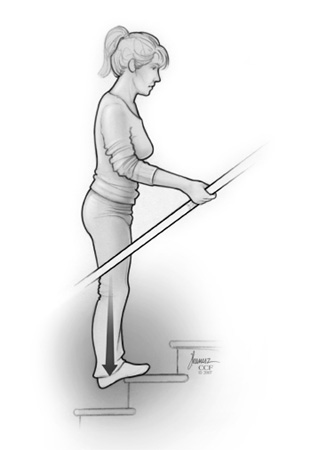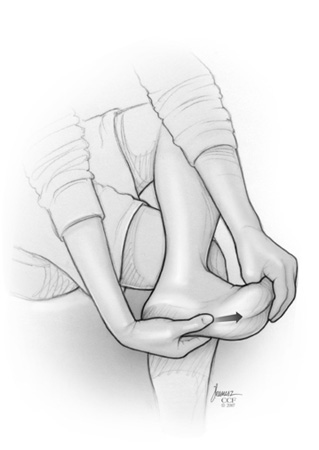Patient discussions
Plantar fasciitis has a negative impact on health-related quality of life and is frequently associated with significant disability due to pain, as well as psychological distress. Patients may have unrealistic expectations that medical care can rapidly eliminate their symptoms, leading to frustration when their expectations and needs are apparently unmet. Patient education or instruction is vital for a good outcome. It is recommended that practitioners take time to explain the likely course of the condition, as well as the fact that treatment is largely conservative and symptomatic.[90]
Perhaps the most important predictor of benefit from conservative treatment is a patient's adherence to the treatment plan. At the initial visit, avoidance of aggravating physical activities should be recommended, and instructions for stretching provided.
The achilles and plantar fascia stretches are often dispensed via an educational handout and demonstrated in the office.
Instruction is required when night splints are prescribed; the patient should be advised to wear the splint for at least 6 hours each night, and for a duration of 8 weeks on average. Patients need to have good sleep habits and to be able to lie on their side or back.
Patients are also encouraged to wear shoes at all times to provide support and shock absorption. Insoles are typically recommended for those who present with first-time foot pain and without major deformity.[Figure caption and citation for the preceding image starts]: Achilles stretchFrom the collection of Alex Koleszar, Cleveland Clinic; used with permission [Citation ends]. [Figure caption and citation for the preceding image starts]: Plantar stretchFrom the collection of Alex Koleszar, Cleveland Clinic; used with permission [Citation ends].
[Figure caption and citation for the preceding image starts]: Plantar stretchFrom the collection of Alex Koleszar, Cleveland Clinic; used with permission [Citation ends].
Use of this content is subject to our disclaimer